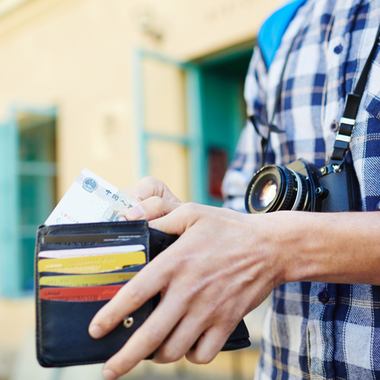
- Five minutes read
A cashless Christmas? Why access to cash is key to unlocking festive cheer for many
In an increasingly digital payments landscape, there are many good reasons to make sure cash remains part of the mix. And it’s especially at times like Christmas that we see why.
Christmas is traditionally a time of excess. Whether it’s presents, food and drink, or nights out – we like to spend a bit (or a lot) more in December, and generally live with an element of indulgence in the run-up to the New Year.
The average spend on gifts in the UK, for example, is forecast to be £430 per person in 2022. And the Bank of England estimates that overall we spend on average £740 more in December – a 29% increase compared to a typical month throughout the year.
But it’s also a balancing act.
The vast majority of us don’t have unlimited budgets – so for many, Christmas is about trying to push the boat out a little, but with a watchful eye on our spending.
The festive big spend
This year, rising inflation (11.1% in October 2022, which is a 42-year high) and energy prices – the unavoidable cost-of-living crisis – has added to the pressure on households and peoples’ wallets during the festive period.
The affordability of everyday goods and services for many consumers is already a major issue, and it’s forecast to get worse before it gets better. Therefore the ability to indulge – buying presents and other items that probably wouldn’t be on the shopping list the rest of the year round – becomes that much harder.
For example, this year’s estimated £430 spend on presents per person in the UK, as noted above, is 22% lower compared to 2021’s £548. This represents a significant tightening of Christmas belts in response to the rough economic ride people have been experiencing in 2022.
So it’s clear that managing personal and household budgets is doubly important in the current climate. As a result, people are turning to cash to help control their expenditure, while still being able to treat themselves.
Why?
People know where they are with cash. It’s long been a critical tool in effective budgeting, especially at times of year such as Christmas when spending can easily spiral out of control.
But it seems that when we need it most, access to – and use of – cash is becoming more difficult for many UK consumers.
Is access to cash in the balance?
The big increase in contactless payments during the pandemic hasn’t noticeably reversed since we’ve gone back to our normal lives. Many retailers have continued encouraging digital payments to the point that they don’t accept cash anymore – or are looking at going cashless in the future.
But this is problematic for many.
In our 2022 Lost in Transaction: Consumer payments trends research, 70% of consumers said they’d be worried if they could no longer access cash, with 59% perceiving it as the most reliable form of payment.
But with the current trend towards contactless over cash in many retail sectors – compounded by banks and building societies closing at a rate of 40% between 2012 and 2022 – access to cash seems in the balance.
In the UK, the proposed Financial Services and Markets Bill is giving the Treasury and Financial Conduct Authority a mandate to protect access to cash services across the country. However, it’s thought that this won’t do much to help in the continued wake of the bank closures we’ve already seen.
Banks will still be able to close branches without breaching cash access rules as long as they maintain ATM services nearby. Plus, the current legislation says little about withdrawal fees, risking a situation where people have access to cash, but only if they pay for it.
The ultimate budgetary tool
While many retailers are encouraging the cashless trend in our increasingly digital society, this doesn’t reflect the reality of demand. Consumers still want it – and governments want to protect it.
It’s an essential option not just for individuals who don’t have a bank account – or people that perhaps have limited access to credit. It benefits us all to have the choice of paying in cash at the checkout, whether in-store or online through eCash.
It’s flexible, easy, and secure. And, as we see when big spend times like Christmas come around, it gives consumers more control and therefore more of a grip on their finances. Many people save up throughout the year to afford the luxuries of the festive season with cash in a way that they can’t do with digital options.
It also avoids the credit trap that many get into at this time of year. For instance, with buy-now, pay-later options (for those who have access to credit), it’s all too easy to see in the New Year laden with debt.
eCash fits all
So traditional cash in today’s digital payments landscape is still relevant – if not vital. This is evidenced by the rise of eCash, whereby consumers checkout online and then pay with physical cash at a nearby store.
Customers are choosing this option more and more. Results from our latest Lost in Transaction survey of small and medium-sized businesses found that merchants recorded a 59% increase in sales completed using eCash in 2022, compared to 50% in 2021. Given its popularity among consumers, more merchants are also offering it as a payment method at their checkouts – 42% are now doing so compared to just 29% in 2021.
With eCash at their disposal, those who don’t have access to bank accounts and credit can use eCommerce services like everyone else.
In the context of Christmas, eCash means all consumers can benefit from being able to shop online, taking advantage of the best offers and allowing them to make their Christmases merry, while keeping their finances in check and avoiding debt.
Essentially, eCash is about choice and control – especially at times when people need it most.




